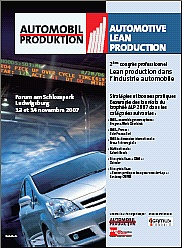Lean, R&D and globalization
|

|
Last update: December 26th, 2008
|
There is a strong belief about shop floor productivity improvement brought by Lean programs as well
as the strategic asset of R&D, both protecting the noblest activities from farming out. These stances have been so
often heard and welcomed that they actually turned out as obvious truth. Residuals productivity gainsAfter farming out productions which could not be optimized regarding the costs and constraints in old Europe and after downcosting the remaining productions with lean programs, the only residuals productivity gains potentials are now located outside of production's scope. In the most advanced companies, the focus of improvement programs moved first onto departments support to production, than on the whole Supply Chain, widening the scope for harvesting further productivity improvements. A great share of the performance in operations and for the global Supply Chain is tightly related to
choices made earlier and upstream, development phase. Many of these choices, on technical or operational levels, cannot
be challenged afterwards, as their conversion costs would be unbearable.
Therefore the necessity to think Lean globally and from the beginning, in R&D. Farming out R&D?Laws of physics apply likewise everywhere on the globe and Chinese, Indian or Brazilian engineers, most often graduates from the best American or European schools, use the same math, the same softwares. They are (still) less expensive than their western colleagues and share the cultural background of their future customers. This intimate knowledge of local markets and local constrains, as well as local habits give them additional value. What about experience and know-how? In the context of breakthrough innovation for the low cost car, experience is rather a handicap. Finding new solutions means reconsidering the problem from a new point of view, out of usual frames. Know-how has to be recreated in the new paradigm. Experience, know-how and technology stealingWhat about the risk of technology stealing? In a first time stealing existing technology is nonsense as old or actual solutions do not respond efficiently to the low cost challenge. New innovative solutions will be interesting to purchase, license or adapt onto higher end models for mature markets. If the successful R&D is located in the emerging markets, the technology stealing could go East to West or South to North. More reading material
|
| This page was brought to you by ©hris HOHMANN - http://chohmann.free.fr/
| ||||||||||||||||||||||||||

